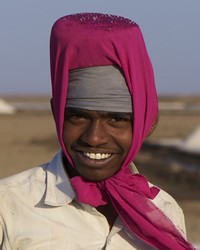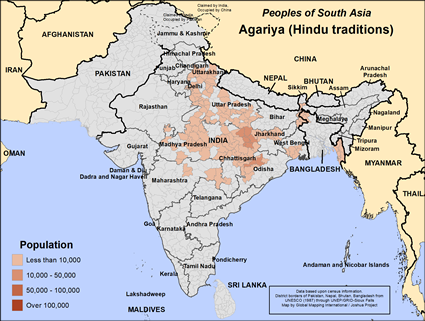Agariya (Hindu traditions) in India

Photo Source:
Copyrighted © 2026
Malcolm P Chapman - Shutterstock All rights reserved. Used with permission |

Map Source:
People Group data: Omid. Map geography: UNESCO / GMI. Map Design: Joshua Project.
|
| People Name: | Agariya (Hindu traditions) |
| Country: | India |
| 10/40 Window: | Yes |
| Population: | 211,000 |
| World Population: | 211,000 |
| Primary Language: | Agariya |
| Primary Religion: | Hinduism |
| Christian Adherents: | 0.29 % |
| Evangelicals: | 0.00 % |
| Scripture: | Translation Started |
| Ministry Resources: | No |
| Jesus Film: | No |
| Audio Recordings: | Yes |
| People Cluster: | South Asia Tribal - other |
| Affinity Bloc: | South Asian Peoples |
| Progress Level: |
|
Introduction / History
The Agariya are one of the nine Munda-Santal tribes. Traditions regarding the origin of the Munda-Santal tribes are uncertain; but originally, a forested area of Chotanagpur (in eastern India) was ruled by chiefs of various tribes. Gradually, the British established their authority in the plains. The British colonialists had partial control over these tribes at that point. The Agariya name comes from the Hindi word for fire. For generations, they worked with furnaces as iron-smelters.
What Are Their Lives Like?
Today, the Agarias continue to work with metal. They manufacture agricultural tools such as axes, ploughshares and sickles. Many have turned to farming and raising livestock. Others specialize in making toys such as wooden masks for children. Their children begin working at an early age. Consequently, only 10 percent of the Agaria people are literate. Of late, however, education has taken on a more important role, and parents are making efforts to send their children to school. In 1950, the Indian Constitution granted caste-related privileges to the Agarias. The law established quotas in government jobs and higher education. Affirmative action created development programs. Nonetheless, some Agaria people have been prey to money-lenders and have not been able to afford amenities such as electricity. Munda-Santal tribes like the Agariyas are divided into clans who recognize a common ancestor. The clans often marry those who are from other tribes; however, there are smaller sub-tribes who are permitted to marry only those within their group. There is also a bachelor's dormitory, dhumkuria, in all Munda-Santal groups except the Juango. Tribal culture among the Agariya and other Munda-Santal tribes is quickly changing under the impact of industrialization, new communication links, tribal welfare schemes, and community development projects.
What Are Their Beliefs?
Hinduism is the official religion of the Agariyas, and Dulha Deo is the family god. They revere cattle. This tribe worships a sun god, "mother earth," and also a god of creation. On special days they will worship cultivation tools and swords. Agariyas often have a spiritual guide who whispers to them a sacred verse and is available for consultation.
What Are Their Needs?
The precious Agariya tribe is ripe unto harvest; they simply need people to show them the way back to the True God. Who will go?
Prayer Points
Pray that God will send culturally sensitive missionaries who will show them the way to the cross. Pray for a Christ-ward movement to flourish among this people group in the 2020s. Pray for the Agariya people to be blessed with peace, joy and spiritual prosperity as they follow Jesus Christ. Pray for the Lord to protect them from those who wish to exploit them economically.